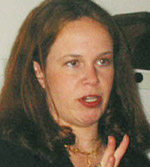Last year, the IAG published reports recommending its own version of the conflict settlement. It is worth mentioning that the mentioned report was the first document to talk about ideas about possibilities of organizing a referendum in Karabagh in the future. The recommendations proposed by the IAG were criticized in Armenia; they were considered partisan and anti-Armenian approach. The document also stated that the IAG received financial support from Turkey. In spite of that, there is no difference between the information given by the IAG and the information concerning the negotiations, as well as the agreement made during the round-table discussions in Bucharest. Anyway, recently Sabena Fraser announced that last year in the summer, the sides were closer to the conflict settlement than after the Rambouillet negotiations. “Before Rambouillet, the sides had more opportunities to establish peace, take Armenian military powers out of the occupied territories and create conditions for refugees to return to their residencies than now and may have at the beginning of 2007. Currently there isn’t information about the conflict settlement and the co-chairmen have given up for some time”, said the IAG representative. Furthermore, she said that she didn’t know which international powers and countries could have enough reputation to support the parties in establishing peace if the US, Russia and France decided to give up generally. “I don’t believe that there will be other supporting parties. We are entering a very dangerous phase, where they may not be any peaceful negotiations”, said S. Fraser. According to Fraser, in such conditions Azerbaijan may start a new war and thus solve its problem in that way. “The parties should not expect help from the international community to solve their problems through a war”, added S. Fraser. Mrs. Fraser said that the current situation is very extreme and added that the announcement of the co-chairmen made in Vienna on June 22 was a very important document and expressed their approach to the conflict settlement. She also said that last year, the IAG had published two reports on the Karabagh conflict issue. The first report contained information about the situation in Karabagh, its surrounding territories and about refugees living in Azerbaijan. As for the second report, it mainly contained information about the negotiations process. The mentioned reports brought some recommendations aimed towards the governments of Armenia and Azerbaijan, as well as to the “de-facto” government of Karabagh and international organizations. S. Fraser noted that the recommendations that they came up with in their second report were very close to those developed by the co-chairmen. S. Fraser made an important announcement. According to the Azeri day.az web page, S. Fraser said that the OSCE co-chairmen recommended the following to the conflicting sides: “For starters, Armenia is to take its military troops out of five occupied regions for starter and then from two other regions, after which the parties are to create necessary conditions for getting the refugees to return to those territories”. The co-chairmen proposed the following recommendations in their announcement as of June 22: taking out Armenian military troops from the occupied Azeri territories and meanwhile being careful with Kelbajar and Lachin. According to RA foreign affairs minister Vartan Oskanyan, the term “being careful” means that it should be noted that Lachin will be a connecting passage between Armenia and Karabagh and Kelbajar can be returned only after organizing a referendum and determining the final status of Karabagh. In spite of this, S. Fraser said that later Lachin would be returned as well. It is interesting that on July 7, besides S. Fraser, the American co-chairman of the OSCE Minsk group, Matthew Bryza spoke about the Karabagh conflict as well. In spite of what S. Fraser said, the latter didn’t say that the situation was so bad. Furthermore, he continued to be optimistic just like the announcement on July 3 was. Generally their announcements contradict each other and Matthew Bryza is optimistic about the Karabagh conflict settlement. Matthew Bryza told the Azeri branch of BBC that the sentence “claiming that the co-chairmen can no longer imagine” does not mean that the negotiations process has entered a deadlock. According to him, that means that the co-chairmen could no longer do anything and it was the presidents’ turn to negotiate and solve problems. “It is not a deadlock. It is a situation when the co-chairmen say that the time has come when the presidents have to make a decision as to what they want”, said Bryza. According to him, both of the presidents have enough political will and want to collaborate, “But we don’t know for sure whether the presidents are ready to make certain decisions and take steps towards reaching a final agreement on the principles”. “The time has come for the leaders to explain to their societies what kind of benefits peaceful settlements have and how the sides can reach peace by making compromises. It is a diplomatic way, but not a new war”, noted the American co-chairman. Matthew Bryza said that the settlement recommendations contained fair and hopeful principles. “These are the best recommendations that have ever been proposed so far. Furthermore, I would say that we are closer to peace than ever. But I am not sure that the presidents will not use their right of self-determination and will not make changes in the principles”, said M. Bryza. According to him, the announcements on the part of the US concerning the territorial integrity of Azerbaijan and the right of self-determination of nations don’t contradict each other. “If you pay attention to the announcements of the co-chairmen, you will see that they contain both of these principles. The most important thing is to combine the two principles during the negotiations”, concluded M. Bryza.

